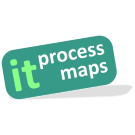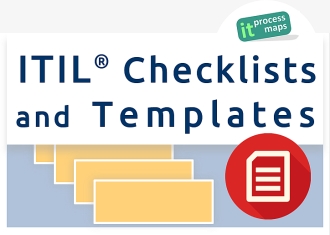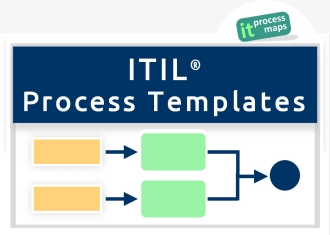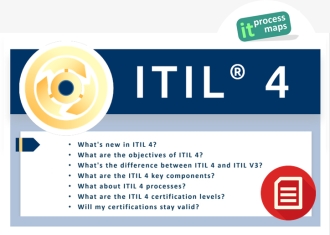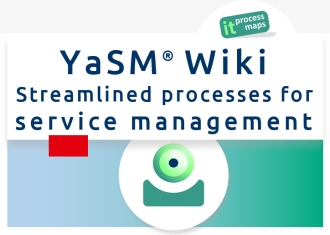ITIL Application Management: Difference between revisions
No edit summary |
|||
| Line 1: | Line 1: | ||
< | <itpmch><title>ITIL Application Management | IT Process Wiki</title> | ||
<meta name="keywords" content="itil application management, application management itil" /> | |||
<meta name="description" content="Application Management: ITIL process definition - Sub-processes - Terms - Additional information on ITIL Application Management." /> | |||
</itpmch> | |||
<imagemap> | <imagemap> | ||
Image:ITIL-Wiki-deutsch.jpg|right|ITIL Application Management | Image:ITIL-Wiki-deutsch.jpg|right|ITIL Application Management | ||
| Line 8: | Line 10: | ||
<br style="clear:both;"/> | <br style="clear:both;"/> | ||
<html><div itemscope="itemscope" itemtype="https://schema.org/WebPage"><!-- define schema.org/WebPage --><p></html> | |||
<p> </p> | <p> </p> | ||
'''<span id="Overview">Objective:</span>''' <html><span itemprop="description"><i><span itemprop="name Headline">ITIL <span itemprop="alternativeHeadline">Application Management</span></span></i> is responsible for managing applications throughout their lifecycle. This process plays an important role in the application-related aspects of designing, testing, operating and improving IT services, as well as in developing the skills required to operate the IT organization's applications. Application Management is an ongoing activity, as opposed to Application Development which is typically a one-time set of activities to construct applications.</span></p> | |||
<p><b>Part of</b>: <a itemprop="isPartOf" href="https://wiki.en.it-processmaps.com/index.php/ITIL_Service_Operation" title="ITIL Service Operation">Service Operation</a></html> | |||
''' | |||
'''Process Owner''': [[ITIL Application Management#Applications Analyst|Applications Analyst]] | '''Process Owner''': [[ITIL Application Management#Applications Analyst|Applications Analyst]] | ||
| Line 20: | Line 20: | ||
<p> </p> | <p> </p> | ||
== Process Description == | ==Process Description== | ||
Application Management is treated in ITIL as a "[[ITIL Functions|function]]". | |||
[[Image:Application-management-itil.jpg|right|thumb|375px|alt=Application Management ITIL|[https://wiki.en.it-processmaps.com/images/pdf/process_overview_application_management_itil.pdf ITIL Application Management]]] | [[Image:Application-management-itil.jpg|right|thumb|375px|alt=Application Management ITIL|[https://wiki.en.it-processmaps.com/images/pdf/process_overview_application_management_itil.pdf ITIL Application Management]]] | ||
It plays an important role in the management of applications and systems. | |||
Many Application Management activities are embedded in various ITIL processes - but not all Application Management activities. For this reason, at IT Process Maps we decided to introduce an Application Management process as part of the [https://en.it-processmaps.com/products/itil-process-map.html ITIL Process Map] which contains the Application Management activities not covered in any other ITIL process. | |||
Application Management activities embedded in other processes are shown there, with responsibility assigned to the [[ITIL Application Management#Applications Analyst|Applications Analyst]] role. | |||
The process overview of [[Media:Application-management-itil.jpg|ITIL Application Management]] is showing the most important interfaces ''(see Figure 1)''. | |||
<p> </p> | <p> </p> | ||
== | ==Sub-Processes== | ||
No sub-processes are specified for [[ITIL Application Management|ITIL Application Management]]. | |||
<p> </p> | <p> </p> | ||
==Definitions== | |||
<html><div itemscope="itemscope" itemtype="https://schema.org/ItemList"><!-- define schema.org/ItemList --> | |||
<meta itemprop="itemListOrder" content="Ascending" /> | |||
<p><span itemprop="name">The following <a href="/index.php/ITIL%20Glossary#ITIL%20Glossary%20A-Z" title="ITIL Glossary">ITIL terms and acronyms</a> (<i>information objects</i>) are used in the Application Management process to represent process outputs and inputs:</span> | |||
</p> | |||
<p> </p> | |||
<p><b><span id="Skills_Inventory" itemprop="itemListElement">Skills Inventory</span></b> | |||
</p> | |||
<ul><li itemprop="description">The Skills Inventory identifies the skills required to deliver IT services (now and in future), as well as the individuals who possess those skills. The Skills Inventory is the basis for developing training plans for individual employees. | |||
</li></ul> | |||
</div><!-- end of schema.org/ItemList --><p></html> | |||
<p> </p> | <p> </p> | ||
== Roles | Responsibilities == | ==Roles | Responsibilities== | ||
'''<span id="Applications Analyst">Applications Analyst - Process Owner</span>''' | |||
*The Applications Analyst is an Application Management role which manages applications throughout their lifecycle. There is typically one Applications Analyst or team of analysts for every key application. This role plays an important part in the application-related aspects of designing, testing, operating and improving IT services. It is also responsible for developing the skills required to operate the applications required to deliver IT services. | |||
<p> </p> | <p> </p> | ||
{| border="1 | {| border="1" cellpadding="5" cellspacing="0" style="margin-left: auto; margin-right: auto; text-align:center;" valign="top" | ||
|- | |- | ||
| | |style="vertical-align:top; text-align:center" colspan="2" style="background:#ffffdd;"| '''Responsibility Matrix: ITIL Application Management''' | ||
|- | |- | ||
! | ! style="background:#ffffee; width: 65%; text-align:center" | ITIL Role / Sub-Process | ||
! style="background:#ffffee;" | [[ITIL Application Management#Applications Analyst|Applications Analyst]] | ! style="background:#ffffee;" | [[ITIL Application Management#Applications Analyst|Applications Analyst]] | ||
|- | |- | ||
| | |style="text-align:left;" |[[ITIL Application Management|Application Management]]<br /> ''(no sub-processes specified)'' | ||
| A[[ITIL Application Management#Accountable|<small>[1]</small>]]R[[ITIL Application Management#Responsible|<small>[2]</small>]] | | A[[ITIL Application Management#Accountable|<small>[1]</small>]]R[[ITIL Application Management#Responsible|<small>[2]</small>]] | ||
|- | |- | ||
| Line 75: | Line 80: | ||
<span id="Accountable">[1] ''A: Accountable'' according to the RACI Model: Those who are ultimately accountable for the correct and thorough completion of the ITIL Application Management process.</span> | <span id="Accountable">[1] ''A: Accountable'' according to the RACI Model: Those who are ultimately accountable for the correct and thorough completion of the ITIL Application Management process.</span> | ||
<span id="Responsible">[2] ''R: Responsible'' according to the RACI Model: Those who do the work to achieve a task within | <span id="Responsible">[2] ''R: Responsible'' according to the RACI Model: Those who do the work to achieve a task within Application Management.</span> | ||
<p> </p> | <p> </p> | ||
<p> </p> | |||
==[ Infobox ]== | |||
<html><table class="wikitable"> | |||
<tr> | |||
<td>Link to this page:</td> | |||
<td><a itemprop="url" href="https://wiki.en.it-processmaps.com/index.php/ITIL_Application_Management">https://wiki.en.it-processmaps.com/index.php/ITIL_Application_Management</a></td> | |||
</tr> | |||
<tr> | |||
<td>Languages:</td> | |||
<td><span itemprop="inLanguage" content="en">English</span> | <span><a itemprop="citation" class="external text" href="https://wiki.de.it-processmaps.com/index.php/ITIL_Application_Management" title="ITIL Application Management">Deutsch</a></span></td> | |||
</tr> | |||
<tr> | |||
<td>Image:</td> | |||
<td style="vertical-align:top"><a itemprop="primaryImageOfPage" href="https://wiki.en.it-processmaps.com/images/d/d6/Application-management-itil.jpg" title="Application Management">ITIL Application Management (.JPG)</a></td> | |||
</tr> | |||
<tr> | |||
<td>Author:</td> | |||
<td><span itemprop="author">Stefan Kempter</span>, <span itemprop="creator copyrightHolder publisher">IT Process Maps</span> <a rel="author" href="https://plus.google.com/111925560448291102517"><img style="margin:0px 0px 0px 0px;" src="/skins/Vector/images/itpm/bookmarking/gplus.png" width="16" height="16" title="By: Stefan Kempter | Profile on Google+" alt="Author: Stefan Kempter, IT Process Maps GbR" /></a></td> | |||
</tr> | |||
</table> | |||
<p><small> | |||
<span itemscope="itemscope" itemtype="http://data-vocabulary.org/Breadcrumb"> | |||
<a href="https://wiki.en.it-processmaps.com/index.php/ITIL_Application_Management#Process_Description" itemprop="url"><span itemprop="title">Process Description</span></a> › | |||
</span> | |||
<span itemscope="itemscope" itemtype="http://data-vocabulary.org/Breadcrumb"> | |||
<a href="https://wiki.en.it-processmaps.com/index.php/ITIL_Application_Management#Definitions" itemprop="url"><span itemprop="title">Definitions</span></a> › | |||
</span> | |||
<span itemscope="itemscope" itemtype="http://data-vocabulary.org/Breadcrumb"> | |||
<a href="https://wiki.en.it-processmaps.com/index.php/ITIL_Application_Management#Roles_.7C_Responsibilities" itemprop="url"><span itemprop="title">Roles</span></a> | |||
</span> | |||
</small></p> | |||
</div><!-- end of schema.org/WebPage --><p></html> | |||
<!-- This page is assigned to the following categories: --> | <!-- This page is assigned to the following categories: --> | ||
[[Category:ITIL V3]][[Category:ITIL 2011]][[Category:ITIL process]][[Category:Service Operation|Technical Management]][[Category:ITIL Application Management|!]] | [[Category:ITIL V3]][[Category:ITIL 2011]][[Category:ITIL process]][[Category:ITIL function]][[Category:Service Operation|Technical Management]][[Category:ITIL Application Management|!]] | ||
<!-- --- --> | <!-- --- --> | ||
Revision as of 19:21, 26 December 2013

Objective: ITIL Application Management is responsible for managing applications throughout their lifecycle. This process plays an important role in the application-related aspects of designing, testing, operating and improving IT services, as well as in developing the skills required to operate the IT organization's applications. Application Management is an ongoing activity, as opposed to Application Development which is typically a one-time set of activities to construct applications.
Part of: Service Operation
Process Owner: Applications Analyst
Process Description
Application Management is treated in ITIL as a "function".
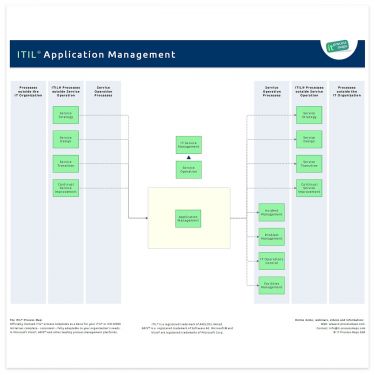
It plays an important role in the management of applications and systems.
Many Application Management activities are embedded in various ITIL processes - but not all Application Management activities. For this reason, at IT Process Maps we decided to introduce an Application Management process as part of the ITIL Process Map which contains the Application Management activities not covered in any other ITIL process.
Application Management activities embedded in other processes are shown there, with responsibility assigned to the Applications Analyst role.
The process overview of ITIL Application Management is showing the most important interfaces (see Figure 1).
Sub-Processes
No sub-processes are specified for ITIL Application Management.
Definitions
The following ITIL terms and acronyms (information objects) are used in the Application Management process to represent process outputs and inputs:
Skills Inventory
- The Skills Inventory identifies the skills required to deliver IT services (now and in future), as well as the individuals who possess those skills. The Skills Inventory is the basis for developing training plans for individual employees.
Roles | Responsibilities
Applications Analyst - Process Owner
- The Applications Analyst is an Application Management role which manages applications throughout their lifecycle. There is typically one Applications Analyst or team of analysts for every key application. This role plays an important part in the application-related aspects of designing, testing, operating and improving IT services. It is also responsible for developing the skills required to operate the applications required to deliver IT services.
| Responsibility Matrix: ITIL Application Management | |
| ITIL Role / Sub-Process | Applications Analyst |
|---|---|
| Application Management (no sub-processes specified) |
A[1]R[2] |
Remarks
[1] A: Accountable according to the RACI Model: Those who are ultimately accountable for the correct and thorough completion of the ITIL Application Management process.
[2] R: Responsible according to the RACI Model: Those who do the work to achieve a task within Application Management.
[ Infobox ]
| Link to this page: | https://wiki.en.it-processmaps.com/index.php/ITIL_Application_Management |
| Languages: | English | Deutsch |
| Image: | ITIL Application Management (.JPG) |
| Author: | Stefan Kempter, IT Process Maps |
